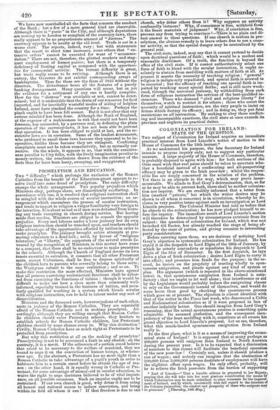PROSELYTISM AND EDUCATION.
THE " difficulty " which prolongs the exclusion of the Roman Catholics from the benefit of the Education-grant appears to re- solve itself into some dread of proselytism. The same difficulty cramps the whole arrangement. Two popular prejudices which Ministers obey, perhaps share, are diametrically conflicting. In accordance with one, it is resolved that religious instruction shall be mingled with the whole course of secular instruction; an ar- rangement which encumbers the process of secular instruction, and tends to impart to religion a vulgar familiarity very foreign to the intention. It is about as bad as if men were debarred from learn- ing any trade excepting in church during service. But having made that resolve, Ministers are obliged to consult the opposite prejudice. Every sect labours under a keen jealousy lest its own religious instruction should be trenched upon, and teachers should take advantage of the opportunities afforded by tuition in order to make proselytes. The jealousy brought active attempts at pro- moting education to a dead lock ; until, by favour of "religious toleration," or "liberty," the supporters of the several creeds fa- voured by the recognition of Ministers in this matter have come to a compact, that there shall be no endeavour to make proselytes in the schools. Although the Church of England deems its own tenets essential to salvation it consents that all other Protestant sects, except Unitarians, shall be free to dispose spiritually of the children born to parents who severally belong to those sects ; the Wesleyans submit to the same restriction ; and so on. To make this restriction the more effectual, Ministers have agreed that all persons exercising ecclesiastical functions shall be debar- red from exercising the functions of tuition : though it would be difficult to make out how a class more than commonly well- informed, especially trained in the business of tuition, and pecu- liarly qualified for teaching in a system which blends secular with religious instruction, can be held to labour under any sort of disqualification.
Ministers and the favoured sects, howeverjealous of each other, unite in jealousy of the Roman Catholics. They are especially afraid of the Roman Catholic zeal in making proselytes. Ac- cordingly, although they are willing enough that Roman Catho- lic children should enter Protestant schools, they hesitate to establish schools for Roman Catholic children, lest Protestant children should by some chance creep in. Why this distinction ? Civilly, Roman Catholics have as much right as Protestants to be protected from proselytism.
But why this restriction at all on the making of proselytes? Proselytizing is not to be accounted a fault in any.church : on the contrary, it is a merit. If the adherents of a certain creed believe that creed to be necessary to the welfare of mankind, they are bound to urge it on the conviction of human beings, at whatso- ever age. In the abstract, a Protestant has no more right than a Roman Catholic to take advantage of a pupil's youth in order to habituate him to a certain creed before he attains the age of rea- son: on the other hand, it is equally wrong in Catholic or Pro- testant, for some advantage of money-aid in secular education, to waive the right to urge doctrines believed to be of vital import- ance, on all possible occasions. Such an impulse ought not to be restrained. If our own church is good, why debar it from using all honest and rational means to induce conviction, and bring within its fold all whom it can If that freedom is due to one church, why debar others from it? Why suppress an activity confessedly virtuous'? Why, if conscience is free, withhold from it the freest materials of judgment? Why, if conviction is free, prevent any from trying to convince I—There is no plain and di- rect answer to these questions. If one church is zealous in pro- selytism, the obvious remedy is to leave others free to use a coun- ter activity, so that the special danger may be neutralized by the general zeal.
The civil state, indeed, may say that it cannot pretend to decide upon doctrinal questions of faith ; which would be a modest and reasonable disclaimer. Of a truth, the function is beyond the office of the civil state. If it cannot authoritatively select one form of faith to blend with the secular instruction, it ought re- solutely to abstain from meddling with matters of faith at all. At present it asserts the necessity of teaching religion : "general" religion is indignantly repudiated, and special faith is avowed to be essential; but the efficacy of teaching one special faith is im- paired by teaching many special faiths ; and is still more weak- ened, through the universal jealousy, by withholding from each form of religious instruction the services of the best-qualified in- structors. Those who demand "civil and religious liberty" for themselves, watch to restrict it for others ; those who assert the necessity of spiritual instruction, are the very people to insist on fetters which destroy its efficacy ; and in doing so, they put fatal restrictions on all instruction. By seeking to obey these conflict- ing and incompatible exactions, the civil state at once exceeds its province and neglects its practical duties.


























 Previous page
Previous page